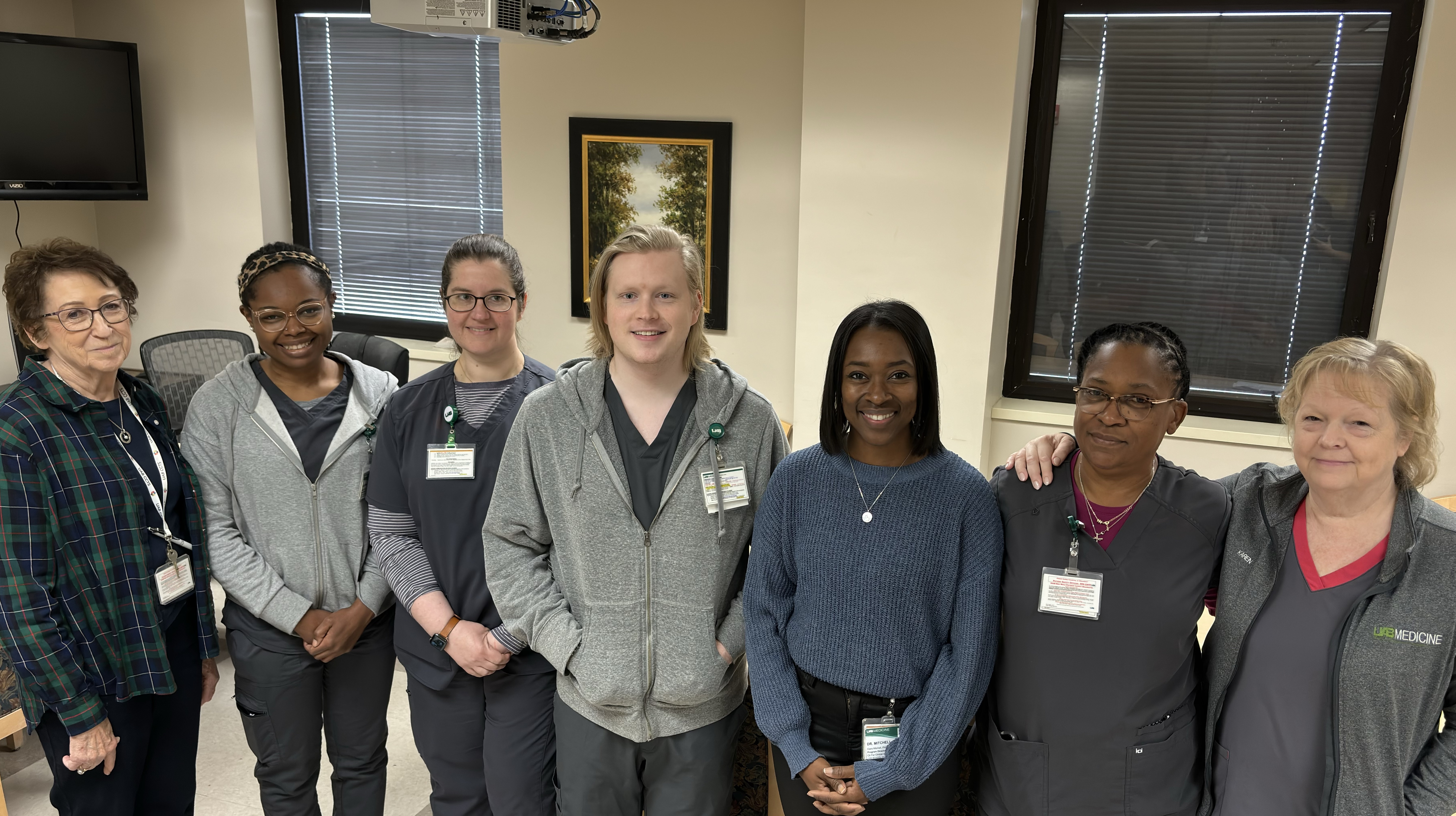 Central to the study's success was the Bionutrition Unit within the CCTS. The unit, led by Bionutrition Research Dietitian, Dr. Ciara Mitchell, PhD, RDN, LD, worked closely with Dr. Lewis and co-investigators in the design and implementation of the study's low-sodium diet using items sourced from grocery stores and online retailers. This approach ensured that the diet was both practical and accessible to the general public. Dr. Mitchell remarks, “A unique feature of this study is that all items on the low-sodium diet menu were commercially available. Following a low-sodium diet can be a challenge, especially if people lack cooking skills, and many commercial foods are high in sodium. This study highlights that consuming a low-salt diet is possible and feasible for people who may lack culinary skills.” The unit's adaptability was also crucial in responding to product availability, frequently finding substitutes to maintain the diet's nutritional integrity.
Central to the study's success was the Bionutrition Unit within the CCTS. The unit, led by Bionutrition Research Dietitian, Dr. Ciara Mitchell, PhD, RDN, LD, worked closely with Dr. Lewis and co-investigators in the design and implementation of the study's low-sodium diet using items sourced from grocery stores and online retailers. This approach ensured that the diet was both practical and accessible to the general public. Dr. Mitchell remarks, “A unique feature of this study is that all items on the low-sodium diet menu were commercially available. Following a low-sodium diet can be a challenge, especially if people lack cooking skills, and many commercial foods are high in sodium. This study highlights that consuming a low-salt diet is possible and feasible for people who may lack culinary skills.” The unit's adaptability was also crucial in responding to product availability, frequently finding substitutes to maintain the diet's nutritional integrity.The team's proactive approach to the multi-site study involving two CARDIA study field centers (Birmingham, AL and Chicago, IL) included regular meetings to share insights and best practices, fostering an environment where innovative solutions were developed to accommodate the varying food preferences and ingredient availability. "It's been a learning curve, working with varied food cultures across the US, but through our collaboration, we've managed to harmonize our menus with regional tastes and supply logistics," Mitchell said.
While it has been generally understood that reducing sodium intake may decrease blood pressure, this study goes further by quantifying the magnitude of this effect and examining its consistency across different populations. The research demonstrated that even moderate reductions in sodium could significantly lower blood pressure, a finding consistent among various demographic groups, including those with and without hypertension. Dr. Lewis highlights the study's implications, “High blood pressure is a leading cause of cardiovascular and kidney diseases globally, and in the US, we are struggling to control hypertension. Since about 3 out of 4 participants experienced blood pressure reduction with the lower sodium diet, regardless of whether they were taking blood pressure medications, this is an important way of helping to control cardiovascular disease, the #1 killer of Americans. In fact, we saw blood pressure reductions on average at a level similar to taking one medication, achieved with foods people could buy themselves.” This study underscores the potential of dietary sodium reduction in public health initiatives and could lead to more personalized dietary recommendations, possibly having a profound effect on population health.
|
The CCTS offers expertise, facilities, and capacities designed to assist every investigator’s individual needs. |
The significant outcomes of this study underscore the CCTS's dedication to health research that resonates beyond the lab. CCTS Director (MPI) Dr. Orlando Gutierrez, MD, MMSc, reflects on the study's broader reach, "The impact of this research will likely influence clinical practice and public policy, aligning with the CCTS's core mission of bringing scientific discoveries into the realm of community impact."
About Coronary Artery Risk Development in Young Adults (CARDIA): The Coronary Artery Risk Development in Young Adults (CARDIA) study examines the development and determinants of clinical and subclinical cardiovascular disease and their risk factors. It began in 1985-6 with a group of 5115 Black and White men and women aged 18-30 years. The participants were selected so that there would be approximately the same number of people in subgroups of race, gender, education (high school or less and more than high school), and age (18-24 and 25-30 years) in each of four field centers: Birmingham, AL; Chicago, IL; Minneapolis, MN; and Oakland, CA.
About the Center for Clinical and Translational Science (CCTS): To speed the translation of research into improved health, the Center for Clinical and Translational Science (CCTS) is committed to increasing research capacity, accelerating research processes, engaging stakeholders in trusting, productive teams, developing and supporting excellence in the research workforce and providing creative, innovative approaches to major health and health care delivery challenges. The vision of the CCTS is to reduce health disparities and diseases disproportionately represented within the Deep South as we accelerate discovery to improve health. The Center has assembled a robust Partner Network – spanning Alabama, Mississippi, and Louisiana – to ensure that research and training efforts serve the communities in our region while maximizing collaborative synergies in translational research to advance fundamental and clinical discovery through application.
About the Clinical and Translational Science Award (CTSA) Program: The CCTS and its Partner Network represent one of nearly 60 Clinical and Translational Science Awards (CTSA) funded by the National Institutes of Health’s National Center for Advancing Translational Sciences (NCATS). The national CTSA Consortium comes together by a shared mission to strengthen the clinical and translational research enterprise “to get more treatments to more patients more quickly.” The CTSA Consortium is committed to developing a knowledgeable translational science workforce; engaging patients and communities in every phase of the translational process; promoting the integration of priority and underserved populations in translational research across the human lifespan; innovating processes to increase the quality and efficiency of translational research, particularly of multisite trials; and advancing the use of cutting-edge informatics.
